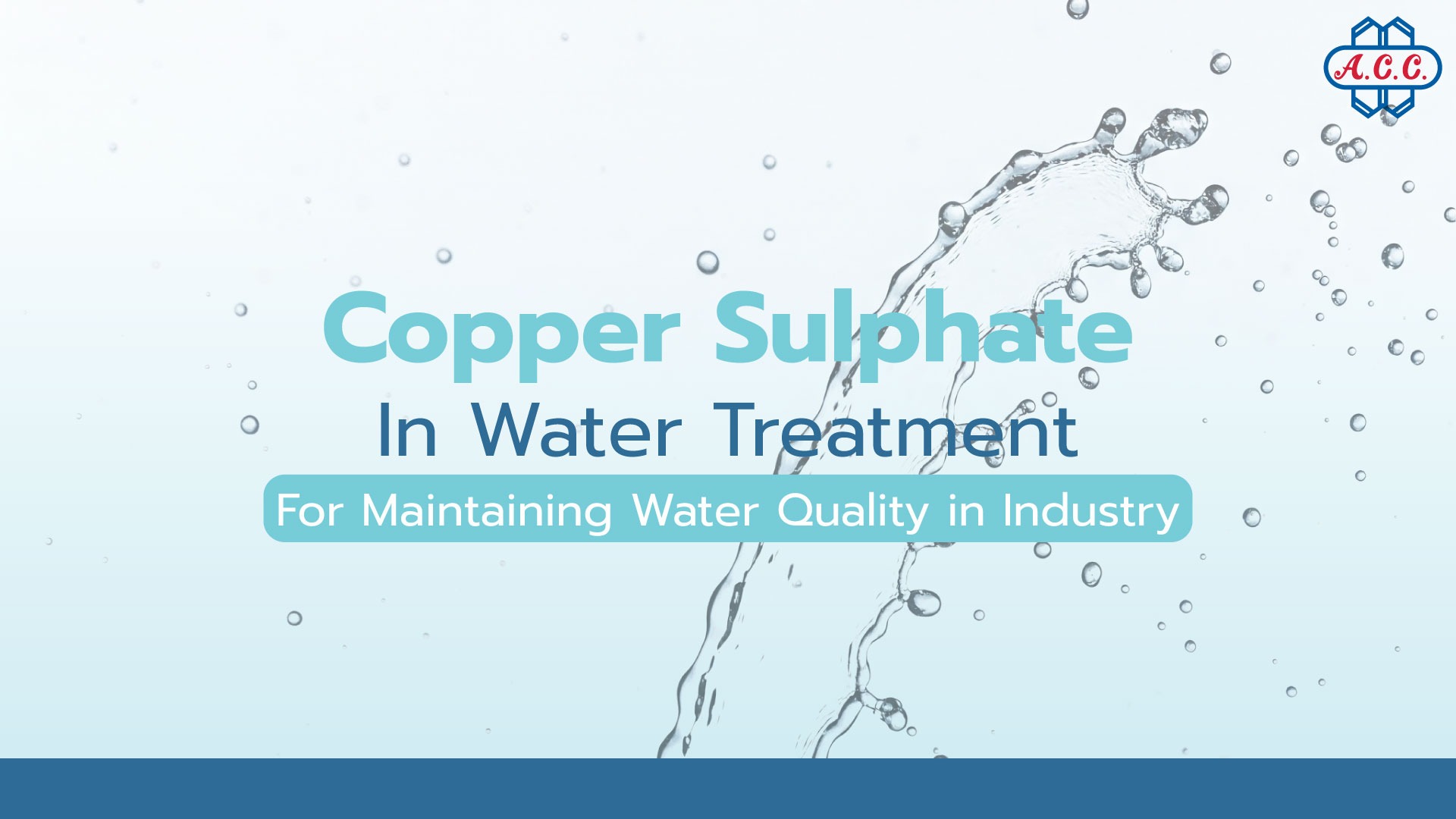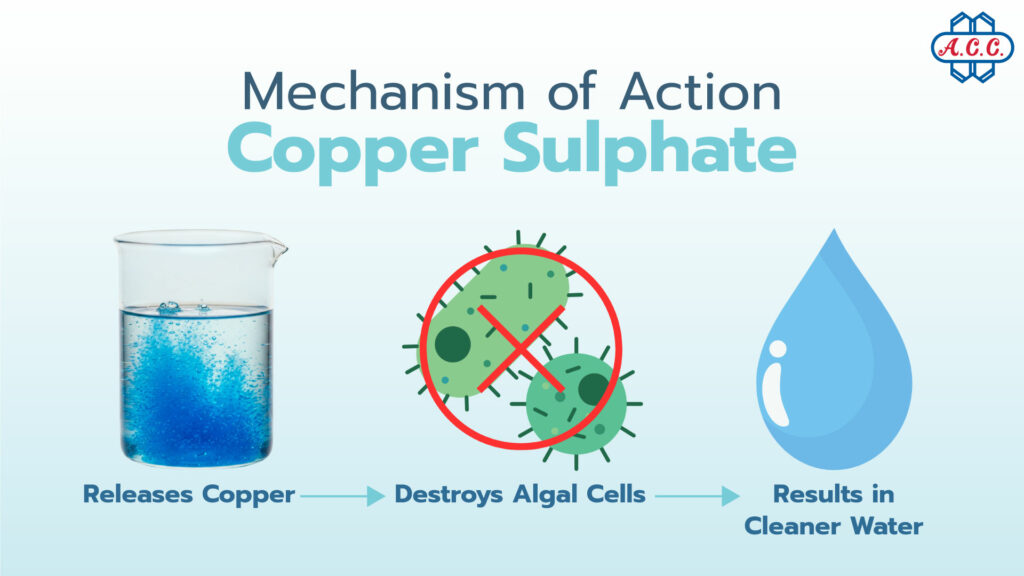
20 Apr Copper Sulphate and Water Treatment for Maintaining Water Quality in Industry
Water is an essential resource for production processes in many industries. However, the use of water in these processes often results in wastewater that must be treated before being released into the environment. Copper Sulphate, a key player in water treatment, plays a significant role particularly in controlling algae and microorganisms that may affect water quality.
This article explores the role and application of Copper Sulphate in industrial water treatment.
What is Copper Sulphate and What Role Does It Play in Water Treatment Systems?
Copper Sulphate also commonly known as “blue vitriol” is a chemical compound with the formula CuSO₄. It appears as blue crystals that are highly soluble in water. When dissolved, it releases copper ions (Cu²⁺), which have the property of inhibiting and eliminating microorganisms such as algae, bacteria and fungi. With these properties, Copper Sulphate is used in water treatment systems to control the growth of algae and microorganisms that may cause problems in water systems.
The Mechanism of Copper Sulphate in Controlling Algae and Microorganisms
When Copper Sulphate dissolves in water, the released copper ions penetrate the cells of algae and microorganisms, disrupting their internal metabolic processes. This results in the inability of the cells to function normally and leads to their eventual death. Using Copper Sulphate to control algae and microorganisms is therefore an effective method for maintaining water quality in treatment systems.

Application of Copper Sulphate in Industrial Wastewater Treatment Plants
In the industrial sector, wastewater treatment is a crucial step to ensure that discharged water meets required standards. Copper Sulphate is used in the wastewater treatment process to control the growth of algae and microorganisms that may cause issues in the water system. The use of Copper Sulphate helps reduce clogging in pipelines and storage tanks, while also improving water quality to be suitable for use or discharge into the environment.
Precautions and Risk Management in the Use of Copper Sulphate
Although Copper Sulphate is beneficial in water treatment, its use must be handled with caution. Overuse may adversely affect the environment and aquatic life. Residual copper ions in the water can accumulate in sediment and re-enter the food chain. Therefore, the use of Copper Sulphate should follow recommended guidelines and established standards to prevent undesirable environmental impacts.
New Technologies and Future Trends in the Use of Copper Sulphate
Water treatment technologies are constantly evolving to improve efficiency and reduce environmental impacts. Future applications of Copper Sulphate may involve optimized methods such as combining it with other technologies to enhance treatment efficiency and reduce chemical usage. Furthermore, the development of alternative chemicals that are more effective and environmentally friendly may become an important trend in the future.
Environmental Laws and Standards Related to the Use of Copper Sulphate
The use of Copper Sulphate in water treatment must comply with environmental laws and regulations to prevent impacts on the environment and public health. In Thailand, the use of chemicals in water treatment is regulated by relevant authorities. Operators should study the regulations and strictly comply with them to ensure safe and effective use of Copper Sulphate.
The Integration of Copper Sulphate with Integrated Water Treatment Systems and Its Use with Other Chemicals
While Copper Sulphate is prominent in controlling algae and microorganisms, industrial water treatment systems, which are often complex, rely on the combined action of multiple chemicals. Copper Sulphate is only one component of an Integrated Water Treatment System, which integrates chemicals, filtration technologies and biological processes to achieve maximum treatment efficiency.
-
Examples of chemicals commonly used with Copper Sulphate
• Flocculants/Coagulants: Used to aggregate suspended particles and impurities in the water, causing them to settle at the bottom of the tank.
• Chlorine or other disinfectants: Used in conjunction to eliminate pathogens during the final stage of the treatment process.
• pH Adjusters (acids or alkalis): Used to modify the pH level of the water to optimize the effectiveness of Copper Sulphate and other chemicals.
Designing a water treatment system for factories is therefore not about using a single chemical but involves evaluating the entire system to achieve the highest treatment efficiency without affecting the environment or violating laws.
Conclusion
Copper Sulphate is a chemical that plays a crucial role in industrial water treatment, particularly in controlling algae and microorganisms that may impact water quality. The use of Copper Sulphate must be carried out carefully and in compliance with relevant laws and standards to avoid environmental and public health impacts. The development of environmentally friendly technologies and treatment approaches will help enhance the effectiveness and safety of Copper Sulphate usage.
Confidence in Every Drop in Your Factory with High-Quality Copper Sulphate from a Professional Chemical Manufacturer
Asian Chemical Co., Ltd. is a certified industrial chemical manufacturer and distributor that complies with various quality standards, ready to meet the water quality control needs of all industries with products that undergo strict quality control.
For inquiries or quotation requests,
📞 Tel. +66 (38) 570 150-2 ext. 106, 107 or +66 (81) 8337 043
📩 Email: [email protected]
🌐 Website: https://acc1976.com/th/
🏢 Asian Chemical Co., Ltd., 85/1 Moo 5, Wellgrow Industrial Estate, Bangna-Trad Rd. Km.36, Bang Samak Subdistrict, Bang Pakong District, Chachoengsao 24130, Thailand



No Comments